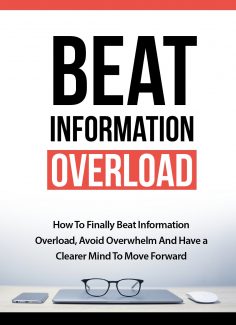 License Type: Master Resell Rights
License Type: Master Resell Rights  File Type: ZIP
File Type: ZIP
 SKU: 64956
SKU: 64956  Shipping: Online Download
Shipping: Online Download
Sample Content Preview
Beat Information Overload
Information overload has become more prominent in the past several decades since the invention of the Internet. Between the texts, tweets, emails, and the endless stream of news feeds on Facebook, the viral videos we can't help but watch, the numerous photos and videos we take and the multiple phone numbers we collect, we've become overwhelmed and overloaded with, mostly, unnecessary and irrelevant information. With 24/7 information that is available to us with a simple click of a mouse, we are creating and digesting ten times more information than we did just ten years ago. With all this information we can quickly succumb to information overload and the fall to the adverse effects it has on our health and mental well-being.
Unfortunately, our minds aren’t designed to handle this much information, and can quickly become overwhelmed as it tries to process all the information we’re exposed to on a daily basis. Information overload can not only hamper our productivity, but it can leave us feeling stressed, depressed, and fatigued. Our conscious minds are designed to pay attention to no more than four things simultaneously, according to Daniel J. Levitin, author of The Organized Mind. If we go much more beyond this, we begin to exercise poorer judgment, lose our focus, and lose track of important things.
To reduce the effects of information overload on our mental well-being and health, we have to make a conscious effort to reduce the flood of information we consume and clear our minds of all the unnecessary information we accumulate on a daily basis. Here are five secrets to learning how to think straight again, overcome procrastination, and spend less time getting more done so we can move forward and better manage the information we’re exposed to in the future.
Secret #1 – Get Things Out of Your Head
The more information we try to cram into our minds, the less our brains are able to accurately process the information, ultimately leading to damaging your short-term memories. This is because our minds were designed with a limited amount of space and ability to handle information. In fact, over the last ten years, we have created more information than in all of human history before that. The best way to deal with this issue is to completely clear your mind of all the clutter and noise by performing a brain dump.
Doing a brain dump means creating an extensive list of everything that you have floating around in your head, whether it's essential or not. Take the time to write down any thought that interrupts your workflow immediately. The simple process of writing these thoughts down helps to get them out of your head. Performing a brain dump allows you to quickly clear your mind of the irrelevant information that is interfering with your ability to focus on the task in front of you. Clearing your mind in this way also gives your brain permission to relax its neural circuits so that you can focus your attention on something else.
Once you’ve gotten your thoughts down on paper, you need to spend some time prioritizing each of the items into separate groups. You should have a category for things that you have to get done today, things that you can delegate, things that you can do this week, and things that you can drop. Productivity guru, David Allen calls these categories: do it, delegate it, defer it, and drop it.
If there is an item on your list that you simply can’t get crossed off, it may be because it’s ill-defined and not actionable. Take a closer look at these items and further break it down into subcategories and create actionable steps that you can take to complete each item.
Secret #2 – Stop Multitasking
For too long, people have considered multitasking as a great way to increase productivity. However, recent studies have shown the opposite effect happens when you multitask. Unfortunately, these studies have discovered that when you engage in multitasking, your productivity in fact decreases. Multitasking costs you by forcing you to decide between whether or not to answer a text, how you should respond, how you should file an email, whether you should stick with what you’re currently working on or move onto the interruption.
All of the little decision that you have to make when you multitask, use the finite amount of oxygenated glucose that your brain contains. The oxygenated glucose is the fuel that your mind needs to focus on a task. Continually switching between tasks, quickly uses up your limited amount of oxygenated glucose, which will lead you feeling exhausted, anxious, and disoriented. When we focus on one task at a time, we use less of this glucose and spend less energy than if we would have engaged in multitasking. Focusing on a single task at a time also reduces our brain’s need for the oxygenated glucose to function.








